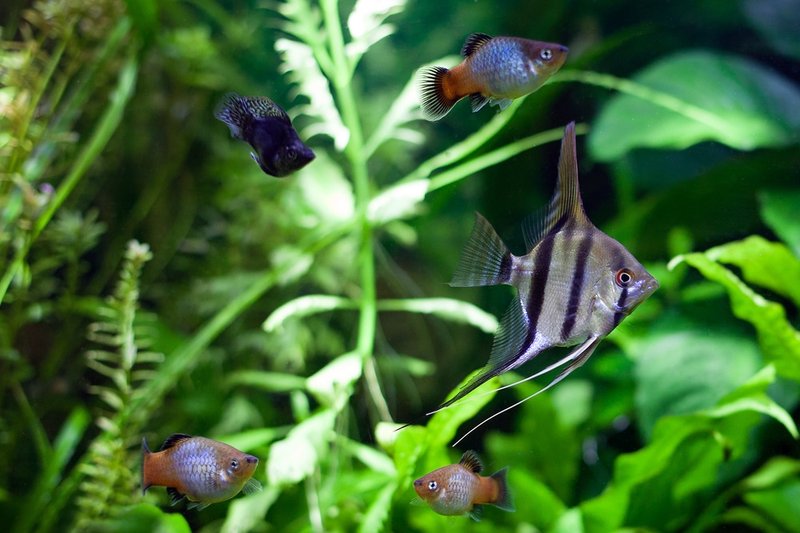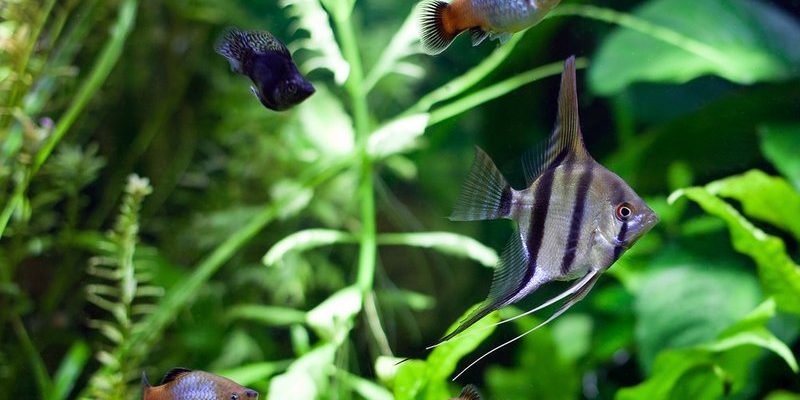
It’s not just about looks; you need to think about temperament, space, and all the little things that help fish live happily side by side. Much like a well-balanced recipe, choosing compatible tank mates requires a bit of research and understanding. So, let’s dive into the world of Marine Angelfish and their compatibility with other fish, and see what combinations might lead to a peaceful aquatic community.
Understanding Marine Angelfish Behavior
Before you start mixing and matching fish, it’s essential to get familiar with the Marine Angelfish’s personality. These fish are known for their somewhat territorial nature, especially as they mature. They can be a bit feisty, especially in smaller tanks. Think of them as the older sibling in the tank—often wanting their space and a little more say in the household.
Marine Angelfish can also exhibit varying behaviors depending on their specific species. Some, like the Emperor Angelfish, might be more assertive, while others, like the Coral Beauty, can be a tad more docile. Knowing the exact type of Angelfish you’re considering helps set the stage for who they can live peacefully with.
If you want them to thrive, you need to create an environment that reflects their natural habitat—plenty of hiding spots and open swimming space can help reduce territorial disputes.
Choosing Compatible Tank Mates
Now that you understand the basics of Marine Angelfish behavior, it’s time to explore who they can share their tank with. Compatibility often depends on size, temperament, and swimming habits. Here are some popular choices and considerations:
- Clownfish: These little guys are often a hit. They have a strong personality but usually don’t bother Angelfish. Just make sure your tank is large enough for both to have their space.
- Damselfish: Similar to Clownfish, Damselfish can be a good match, but they can be a bit feistier. Monitor them closely to avoid any turf wars.
- Rabbitfish: Known for their peaceful nature, Rabbitfish can usually coexist well with Angelfish without stepping on any fins.
However, avoid fish that are similarly territorial or aggressive, such as many types of wrasses or larger tangs. It’s all about finding the right balance—think of it like arranging a seating chart at a dinner party. You want to pair the right personalities together for a peaceful experience.
Tank Size Matters
The size of your tank plays a huge role in the compatibility of Marine Angelfish with other fish. Just like we need space to coexist, so do fish. Larger tanks, ideally 75 gallons or more, allow for more fish and provide enough room for individual territories.
Imagine trying to fit too many guests into a small room—it can quickly get crowded and uncomfortable. In a cramped tank, even the most peaceful fish may become aggressive as they compete for space and resources. A good rule of thumb is to add only one Angelfish per tank and carefully select mates that won’t disrupt the peace.
Here are some general guidelines regarding tank size:
- For one Marine Angelfish, aim for at least a 75-gallon tank.
- Add another 20 gallons for each additional fish you plan to introduce.
More space creates a better environment, leading to happier and healthier fish.
Feeding and Care for Angelfish and Their Tank Mates
Caring for your Marine Angelfish goes beyond just tank mates. It’s crucial to provide a balanced diet to keep them happy and healthy. Angelfish enjoy a varied diet that includes:
- High-quality pellets or flakes
- Frozen or live foods like brine shrimp and seaweeds
- Algae-based foods which they love to munch on
When you introduce other fish, ensure they’re compatible in terms of dietary needs. Some fish may require different types of food, leading to competition during feeding time. Providing plenty of food for all your fish helps minimize aggression and promotes a peaceful community.
Also, regular water quality checks and maintenance are essential. Keeping the tank clean and parameters stable reduces stress and promotes healthy behavior among your fish.
Signs of Unhappiness or Aggression
You might be wondering how to tell if your Marine Angelfish or their tank mates are unhappy or stressed. Recognizing signs early can prevent more severe issues down the line. Here are some indicators to watch for:
- Fighting: If you see fish chasing or nipping at each other, it’s a clear sign that they’re not getting along.
- Hiding: If an Angelfish or any of its tank mates are constantly hiding, it could mean they’re feeling threatened.
- Loss of Appetite: When fish stop eating, it can indicate stress or illness.
Keeping an eye on your aquarium’s social dynamics will help ensure a peaceful environment. Quick adjustments can often resolve conflicts before they escalate.
When to Consider a Species-Only Tank
If you’re still unsure about tank mates or if you find your Marine Angelfish are too feisty with others, you might want to consider a species-only tank. Here, you can focus solely on Angelfish, allowing them to exhibit their natural behaviors without the stress of competition.
This setup can be especially rewarding for those who appreciate watching their Angelfish interact with each other. Just like a close-knit community, each fish can develop its own social hierarchy, which can be fascinating to observe.
However, keep in mind that species-only tanks also require attention to detail, such as varying the diet and providing adequate space, much like any other community tank.
Final Thoughts on Marine Angelfish Compatibility
Choosing the right tank mates for your Marine Angelfish is all about understanding their behavior, needs, and the dynamics of your aquarium. With the right preparation, you can create a peaceful and thriving aquatic environment.
Remember, it’s essential to do your research on each species you consider and to monitor their interactions closely. Understanding their unique personalities and creating a spacious, well-maintained tank will help ensure that your Marine Angelfish and its companions live harmoniously together. So, gear up, do your homework, and create that perfect underwater community!

